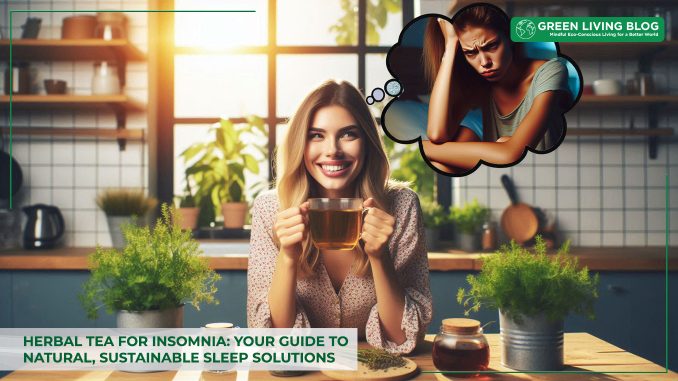
Insomnia disrupts not only your sleep—but your mood, focus and overall quality of life.
Whether it’s difficult for you to fall asleep or you wake up frequently, or you experience early morning restlessness, insomnia can feel like a relentless cycle.
While traditional sleeping pills may offer temporary relief, many are turning to natural, non-addictive alternatives—and herbal teas are among the most effective.
How Herbal Teas Encourage Restful Sleep Naturally

The Botanical Science Behind Sleep Teas
Herbal teas are rich in natural compounds such as flavonoids, polyphenols, and essential oils. These elements interact with neurotransmitters like GABA, which promotes relaxation and eases anxiety—two key barriers to good sleep. Ingredients like apigenin (in chamomile) and linalool (in lavender) help quiet the nervous system, regulate cortisol levels, and naturally stimulate melatonin—the hormone that governs sleep cycles.
Why Herbal Tea Is a Better Choice Than Sleep Medications
Unlike conventional sleep aids, herbal teas are non-habit forming, free from synthetic chemicals, and offer a gentler path to slumber. They allow you to fall asleep gradually—without morning fog or dependency. Plus, preparing and sipping a warm, aromatic cup signals to your body it’s time to unwind.
Mother Cuppa Tea, for example, make bedtime rituals both restorative for you and respectful of the planet. Their plastic-free, compostable and sustainable packaging supports your health and the environment with every sip. They believe that wellness should never come at the planet’s expense. That’s why their range of herbal teas for insomnia is not only crafted for sleep support but is also ethically sourced—because true rest comes from peace of mind and purpose.
Top 7 Best Herbal Teas for Sleep Support

1. Chamomile Tea – The Gentle Nighttime Staple
Chamomile is nature’s go-to remedy for rest. It contains apigenin, a compound that binds to brain receptors responsible for reducing anxiety and promoting calm. Ideal before bedtime, chamomile tea also eases digestive issues that might otherwise interrupt your rest. It’s floral, fragrant, and works beautifully as a solo infusion or blended with lemon balm.
2. Valerian Root Tea – For Deep, Grounded Sleep
Valerian root supports deeper, more restful sleep thanks to its interaction with GABA receptors. It helps shorten the time it takes to fall asleep and is particularly effective for those with chronic insomnia. The earthy taste can be mellowed when blended with sweeter herbs. Try it 60 minutes before bed for the best results.
3. Lavender Tea – Floral Calm for Stress Relief
Lavender’s sweet scent does more than smell relaxing—it actively reduces nervous tension and stress. Its key components, linalool and linalyl acetate, work in harmony to support better sleep quality. Enjoy a soothing cup on its own or combine it with chamomile or valerian for enhanced sleep support.
4. Passionflower Tea – Perfect for Anxious Minds
Passionflower calms the racing thoughts that often accompany insomnia. With mild sedative and anxiety-reducing properties, it supports both mental stillness and better sleep continuity. A great choice if you struggle to “switch off” at night.
5. Lemon Balm Tea – Subtle, Uplifting Sleep Support
Lemon balm offers a soft citrusy flavour with profound calming effects. It helps to reduce cortisol, supports digestion, and lowers stress—all contributors to sleepless nights. Great as a stand-alone infusion or paired with chamomile for a relaxing nightcap.
6. Rooibos Tea – Caffeine-Free and Antioxidant-Rich
Rooibos isn’t sedative, but creates the perfect basis for an evening ritual. Rich in antioxidants and magnesium, it reduces stress hormone levels and promotes calmness. Best of all, it’s naturally caffeine-free, making it safe for any time of the day.
7. Lemon Verbena Tea – Evening Calm with a Zesty Twist
Lemon verbena gently supports digestion, relieves tension, and soothes the nervous system. Its citrus scent is refreshing, while its calming effects are subtle yet noticeable. Ideal for those who prefer a lighter pre-sleep tea.
Preparation Tips for Herbal Teas for Insomnia

1. Steeping for Effectiveness
Use freshly boiled water (96–98°C) and steep for 5–10 minutes, depending on the herb. Cover your cup to preserve essential oils. A fine-mesh infuser or eco-friendly tea bags help minimise waste.
2. When to Drink
Aim to drink your herbal tea 30 to 60 minutes before bed to allow calming compounds to take effect. Make it a daily ritual for the best results.
3. Try Custom Blends
Blend herbs for combined benefits:
- Chamomile + Lemon Balm for gentle calming
- Valerian + Passionflower for deeper sedation
- Lavender + Rooibos for a fragrant, antioxidant-rich brew
Safety and Considerations
Herbs are powerful, so it’s wise to start with a small amount and watch for sensitivities. Always check with a doctor if pregnant, nursing, or on medications, especially sedatives or thyroid treatments.
Sleep Better, Live Better: Pair Herbal Tea with Healthy Habits

1. Build a Bedtime Routine
Combine your herbal tea with:
- A consistent sleep-wake schedule
- Reduced screen time an hour before bed
- Mindful activities like reading, journaling, or gentle yoga
2. Create a Calm Sleep Space
Cool room. Dark setting. Comfortable bedding. Eliminate electronic distractions and allow your tea ritual to mark the start of sleep time.
3. Eat and Move for Better Sleep
Avoid caffeine late in the day. Eat lighter meals in the evening. Include light exercise and stress-reduction techniques in your day. All of this complements your nightly cup.
How Mother Cuppa Tea Offer Sustainable Herbal Teas for Insomnia
Mother Cuppa Tea don’t just care about your sleep, they care about the planet too. Their range of herbal teas for insomnia is:
- Plastic-free
- Compostable
- Responsibly sourced
- Blended for wellbeing and environmental harmony
They believe in sustainable self-care—because what’s good for your body should also be good for the Earth. Their sleep-supporting range of carefully curated herbal teas for insomnia suits different tastes, needs, and values. Let your evening ritual become a moment of peace, reflection, and rest—with every sip crafted consciously.
![]()
Author Profile

